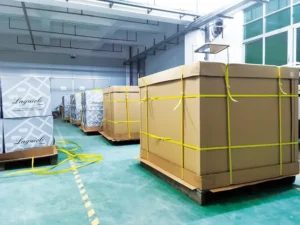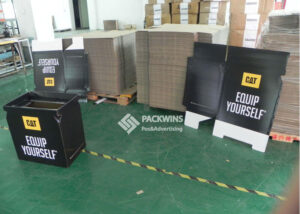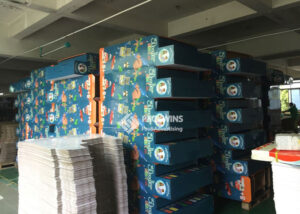Introduction
In the fast-paced world of retail, where shelf space is premium and visual impact drives sales, quarter pallet displays have become a powerful solution for brands looking to stand out. These compact yet impactful displays balance efficiency, mobility, and marketing appeal—making them a top choice for big-box retailers like Walmart, Costco, Sam’s Club, and Target.
In this guide, we’ll explore everything you need to know about quarter pallet displays, including retailer compliance requirements, design tips, and how to avoid costly pitfalls during production and shipping.
What Is a Quarter Pallet Display?
A quarter pallet display is a type of corrugated cardboard retail display that typically occupies one-quarter of a full pallet footprint (600 x 400 mm or 20” x 24”).
It’s designed to be pre-packed at the manufacturer, shipped as-is, and rolled straight onto the retail floor—saving time for store staff and ensuring your product looks great right out of the box.

Why Retailers Love Quarter Pallet Displays
- Quick setup: Merchandisers can place it directly without assembly.
- Easy mobility: Compatible with pallet jacks and forklifts for repositioning.
- Optimized space: Perfect for seasonal promotions or product trials.
- Brand visibility: Full 360° design area for graphics and messaging.
Big Box Retailer Guidelines for Quarter Pallet Displays
Every large retailer has its own display standards that suppliers must follow to ensure safety, logistics efficiency, and visual consistency. Failing to meet these can delay product placement—or worse, result in rejection.
Here’s a quick overview of some key big-box guidelines:
1. Walmart
Walmart does not accept quarter pallet.
2. Costco
Costco does not accept quarter pallet.
3. Sam’s Club
Sam’s Club does not accept quarter pallet.
4. Target
- Retail presentation: Displays must appear clean and “ready to shop.”
- Safety: Rounded corners or reinforced edges recommended.
- Footprint: Quarter pallet must fit within defined floor plan templates.
Pro tip: Before starting your design, ask your retail buyer for the latest Retail Display Compliance Manual—guidelines are updated yearly. Big box stores requires retail ready Shelf-Ready Packaging (RRP) Guide.
Design Essentials for a Successful Quarter Pallet Display
Creating a strong-performing display is more than just visual appeal. Here are the design elements that matter most:
1. Branding That Commands Attention
Use bold colors, clear messaging, and high-resolution product visuals. Include a strong call to action (“Try Me,” “New Arrival,” “Limited Time Offer”).
2. Functional Structural Design
Structure should not only hold weight but also allow easy replenishment and front product access.
3. Material Selection
Use E-flute or double-wall corrugate for strength and print quality balance. Avoid over-engineering—it drives cost without adding shelf value.
4. Retail-Focused Layout
Design for shopper flow and accessibility. If multiple displays are arranged together (as in Walmart 4-pack configurations), ensure graphics align across units for cohesive branding.
Key Points to Avoid Pitfalls in Quarter Pallet Display Design
Avoid these common mistakes that can lead to wasted budget or rejected shipments:
1. Ignoring Product Weight
Always calculate load-bearing limits per layer. Overloading leads to bending or collapse during transit.
2. Neglecting Structural Stability
Include corner posts or double-wall panels for tall displays. Run prototypes through simulated stacking tests.
3. Skipping ISTA Transit Testing
Conduct ISTA 3A or 3E testing to ensure displays survive vibration, compression, and drops.
A failed test can mean costly reprints, lost time, and poor first impressions at retail.
4. Overlooking Pallet Fit
Check that display base dimensions match retailer pallet specs. Even a few millimeters off can affect floor plan placement.
5. Forgetting Graphics Placement
Ensure logos, product names, and barcodes are visible even when units are shrink-wrapped or grouped with others.
Packaging, Shipping, and Setup Considerations
Pre-Packing for Efficiency
Packwins designs displays for pre-filled shipment—so retailers can simply unwrap and roll into place. This reduces labor costs and handling time.
Protective Shipping
Use corner guards, slip sheets, and pallet strapping for stability. Label “Top Load Only” to prevent damage.
On-Site Assembly
Quarter pallet displays are often flat-packed or partially assembled, depending on product category and logistics strategy.
Why Work with Packwins
At Packwins, we specialize in custom corrugated quarter pallet displays that meet retailer standards and transit tests—without sacrificing creativity.
Our process includes:
✅ Concept design & structural engineering
✅ Rapid prototyping & strength testing
✅ ISTA-certified transit validation
✅ Mass production consistency
✅ Global shipping and DDP support
We help your brand go from design to shelf—faster, safer, and smarter.
Conclusion
Quarter pallet displays are more than just packaging—they’re a strategic retail tool that bridges design, logistics, and shopper engagement.
By following retailer guidelines, testing structural performance, and optimizing for shelf-readiness, you can ensure your products reach stores flawlessly and stand out where it matters most—on the sales floor.
📞 Call to Action
Need help creating your next retail display that passes Walmart or Costco compliance the first time?
👉 Contact Packwins today to get a custom quote and free structural consultation.



